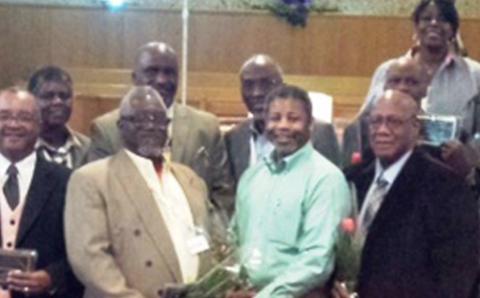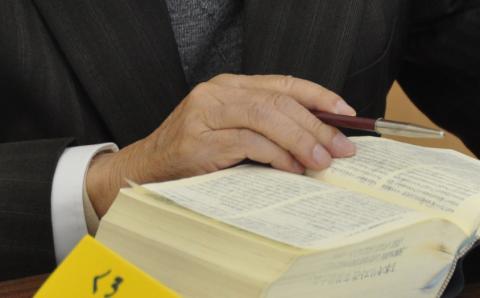Synod 2015 ratified the appointment of Dr. Matthew J. Tuininga as assistant professor of moral theology at Calvin Theological Seminary (CTS).
A pastor’s son who was also a pastor’s son, Tuininga showed confidence as he demonstrated in an interview his qualifications for teaching seminary students. His father taught him to think for himself during his time at seminary, he said, and that “made me more Christo-centric instead of focusing on being Reformed.” Studying at Emory University helped him to consider deeply how to deal in a confessionally Reformed fashion with the issues of the time and culture.
He said he wanted to teach at CTS because “I want to be in a place where [I’m] comfortable,” and he sees CTS as that place. Being there would not be a conversion but continuing a Reformed tradition.
Tuininga believes that theology must always stay related to the church. “Serving the church is where it’s at in doing moral theology,” he said. His intent is to emphasize following Christ and teaching students to do so. Noting that “church history is marked with division,” he indicated that more emphasis needs to be placed on the teaching of Galatians 3: 28 as well as sharing the sacraments of baptism and the Lord’s Supper.
Tuininga stated emphatically that “change is needed with the ethos of being a reconciling body of Christ. We need to ask why things are the way they are.” When asked about revival, his response was clear. “The Bible pays attention to reconciliation. We must focus on gospel preaching . . . and our engagement has to have the dynamic of the gospel.”
He confessed that his time of living in an African American community as a minority was challenging, but he saw the gospel embodied in the church. “I am first and foremost a person who cares about the church and ordinary people. I speak and write to them.”
Discussing what challenges he saw facing the young with the culture’s emphasis on technology, he acknowledged that we have not done enough thinking about it. “We may solve problems, but we need to know we’re made to be in unity with people,” he said “People are allured by technology. Preachers need contact with real people.”
Delegates were offered the opportunity to ask questions. Rev. Frank de Boer, Classis Alberta South/Saskatchewan, asked how Tuininga would prepare students who’ll serve as pastors in churches where homosexual teaching varies. Tuininga indicated he’d begin his teaching at CTS with a course on American sexuality. He sees the temptation to reject folks right away or accept what political, liberal impulse tells us to do. We need to “teach what Scripture teaches us, relating it to creation order, communicate the gospel to all that Scripture teaches, come alongside, and show what fellowship can be in relationship,” he said. He suggests we do lots of hard thinking and wrestling with the issue.
Rev. Tom Bomhof, Classis British Columbia Southeast, asked him about his kingdom theology. Tuininga expressed appreciation for the teachings at Westminster West Seminary and that of Michael Horton, but stood behind “[John]Calvin’s two-kingdom theology being more eschatological” as it deals with the reality of “here and not yet.”
Aren Plante, young adult representative, wondered, “Having grown up in the [United Reformed Church], you’ll be helping CRC pastors. A challenge?” Tuininga responded, “It’ll be a learning curve. I want to be out there involved. My URC wasn’t too different from CRC. There’s more commonality than we like to imagine.” Rev. Ken Bieber, Classis Lake Erie, asked, “Do you see weakness in the CRC that you can help correct?” Tuininga responded by acknowledging that he’s been out of the CRC, but would like to see it develop more evangelical apologetics; he expressed appreciation for what the CRC has that can be shared with the world.
Kurt Monroe, Classis Atlantic Northeast, asked about the role of the Old Testament in Christian ethics. Tuininga replied, “It gives us the vision of how Christ is the fulfillment of kingdom vision . . . and shows what God intends for the world.”
Rev. Sid Sybenga, Classis Greater Los Angeles, wondered about Tuininga’s perspective on women in ministry. Tuininga answered by referring to Calvin’s position that puts women’s roles in an area where we can differ.
On abortion and pro-life, Tuininga suggested, “We need to be as crafty as serpents to get the best laws.” However, he said, much more might be accomplished by other means, by reaching out and being involved with those in distress.
What Rev. Scott Elgersma, Classis California South, wanted to know was, “What did you do with the FBI?” Tuininga’s curt answer: “I was a counter-terrorist analyst after 911,” elicited relieved laughter.
Tuininga said that he’s excited and challenged with what the gospel means and considers it a great privilege to be engaged to think about such things.
Synod 2015 decided they want that engagement at the CRC’s seminary.
Synod 2015 is meeting at Dordt College in Sioux Center, Iowa, from June 12-18. For continuous Banner coverage, please follow The Banner Magazine on Facebook or @crcbanner on Twitter. You can find more tweeting by following hashtag #crcsynod. News stories will be posted at thebanner.org several times daily. For CRC Communications releases, webcast, and live blogging, please visit crcna.org. Unless noted otherwise, all photographs are by Karen Huttenga.
About the Author
George Vink is retired after 50 years as a Christian Reformed pastor. One of his sons is an accident investigator for the Calgary (Alta.) Police Service, and his two brothers are retired from that position. He and his wife, Shirley, are members of Covenant CRC in Cutlerville, Mich.









